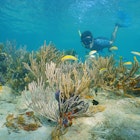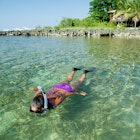
The top things to do in Guatemala, from cultural experiences to volcano treks
Oct 10, 2023 • 7 min read

Guatemala offers a diverse array of travel experiences you'll be sure to remember © mystockimages / Getty Images
Guatemala is a dream destination for nature lovers and adventurers, and while the country has no shortage of outdoor adventures, it offers so much more than volcanoes and jungles.
From studying Spanish in the mountain town of Quetzaltenango to experiencing a sacred Maya cacao ceremony at Lago de Atitlán, Guatemala serves up plentiful opportunities to forge a deeper connection with the people and the land.
Here are our top 12 things to do in Guatemala.
YouTube video player
Paraglide over Lago de Atitlán
The astounding beauty of Lago de Atitlán is usually appreciated from its serene shores or from the peak of the San Pedro volcano, but a more unusual way to take in all of its beauty is by paragliding over the placid waters.
Real World Paragliding will take you on a soaring flight that offers bird’s-eye views of the deep crater lake and the towering trifecta of volcanoes that surround it. The tours take about 45 minutes and start in the village of Santa Catarina Palopo, near Panajachel, or from the village of Santa Clara La Laguna, closer to San Pedro La Laguna.
Surf on a black-sand beach at El Paredon
The black-sand beaches of Guatemala's Pacific coast are growing in popularity as great places to surf. The laid-back fishing village of El Paredon is less crowded than other surf beaches in Central America, and it has waves suitable for both beginners and experienced surfers. The long-established beachfront El Paredon Surf Camp offers basic accommodations, surf lessons and board rentals.

Visit the women weavers of San Juan La Laguna
Made on traditional backstrap looms, Guatemalan textiles are some of the most beautiful in the world, and if you spend any amount of time in this country, you’re bound to become curious about how these colorful patterns are made. The lakeside village of San Juan La Laguna is the perfect place to take a deep dive into the world of weaving while indulging in some socially responsible shopping at the same time.
The narrow streets of San Juan La Laguna are lined with dozens of women’s cooperatives where Mayan weavers create gorgeous, intricate textiles. Arrange a tour through a company such as Casa Flor Ixcaco to visit one of these co-ops and learn how the weavers use local organic cotton and natural dyes made from fruits, vegetables, plants and herbs to create the fabrics. A visit is an excellent way to learn about Guatemalan culture, support local artists, and find some ethical souvenirs to bring back home.
Study Spanish in Quetzaltenango
The mountain town of Quetzaltenango is full of Spanish schools and cafes where you can swot up on grammar dot its rustic, charming cobblestone streets. With a cooler climate than the rest of the country and more economical prices than Antigua, it’s the perfect place to stay and study Spanish in a town less frequented by tourists.
Spanish schools offer homestays and lots of activities to complement in-class learning, including visits to nearby hot springs, volcano hikes and cultural evenings to learn about the history of the region from guest speakers. Proyecto Lingüistico Quetzalteco has been operating its socially responsible language program for many years, and it’s run by a collective of excellent teachers – courses here are highly recommended for those who want to learn more about the social, political and economic realities of life in Guatemala.

Experience a cacao ceremony in San Marcos La Laguna
For a different kind of travel experience, join a hot chocolate ceremony. This activity is gaining popularity in the town of San Marcos La Laguna, where ceremonial circles gather to drink Guatemalan-style hot chocolate under the counsel of a local guide. Cacao has been cultivated in Guatemala since before the conquistadors arrived, and many believe Guatemala to be the original birthplace of chocolate. This ancient foodstuff was used as currency before money was introduced, and it has long been revered as a health elixir and aphrodisiac.
During a cacao ceremony, a Mayan spiritual guide will prepare a drink prepared with ground cacao, sweetenings and spices. The ceremony that follows introduces those in the circle to the sacred and medicinal properties of the cacao bean. Cacao is traditionally known as a heart-opening beverage that helps those who drink it to connect with nature, one another and themselves.
Visit a coffee farm from historic Antigua
Thanks to their lofty elevation, moderate temperatures and mineral-rich volcanic soil, the highlands of Guatemala produce some of the best coffee in the world. Many of the country’s coffee farms are located in the hills around Antigua, making for a perfect day trip from this charming city.
Visitors can take a luxury tour of famous Finca Filadelfia, a gorgeous sprawling plantation that’s more than 140 years old, or opt for a smaller co-op such as De la Gente, where community tours are led by the coffee growers themselves. Both experiences take visitors through the entire coffee-making process from seed to cup, with an opportunity for coffee tasting at the end.
Climb a volcano and roast marshmallows over lava
It can be hard to choose which volcano to climb in Guatemala, but Volcán Pacaya is a good bet for almost everyone. This moderately paced hike starts close to Antigua and can be completed in a day, with the added excitement of seeing fresh lava at the top.
Because Pacaya is a designated national park, plenty of amenities are available including stands where you can rest and buy local treats along the way. But the best snack break happens near the top, where everyone pulls out marshmallows to roast over the cooling lava. Hiking Volcán Pacaya is an easy day trip from Antigua, and the experience is best booked through a local agency.

Shop around in the Chichicastenango market
Nestled in the green mountains of the western highlands, the town of Chichicastenango hosts a famous artisans’ market every Sunday and Thursday. It should be on every serious shopper's list of things to do in Guatemala. The historic market was once the main trading center for the Quiché region before the conquistadors arrived, and the tradition of people coming from surrounding villages to sell goods continues to this day.
Expect to find a labyrinth of stalls piled high with gorgeous textiles – the most popular items are huipils, the traditional blouses woven and worn by Mayan women. Other crafts that can be found at the market include wood carvings, masks, leather goods, pottery, jade and silver and gold jewelry. A visit to the market is an easy day trip from Quetzaltenango or Lago de Atitlán.
Drink at the oldest bar in Guatemala City
Rumored to have been the favorite watering hole of Che Guevara during his many visits to Guatemala City in the 1950s, El Portal was the first proper bar to open in the capital in 1932. It’s tucked in the heart of the historic center, and stopping in for a drink feels like stepping back in time. The menu hasn’t changed much over the years either, and you can sidle up to the old wooden bar and drink a cold pint of Gallo beer while listening to marimba music and enjoying the friendly atmosphere.
Birdwatch in the cloud forests of Alta Verapaz
Teeming with orchids, ferns and bromeliads, the cloud forests of Alta Verapaz are an untouched wilderness and a birdwatcher’s paradise. The best place to spot birds is in the Biotopo del Quetzal, a nature reserve dedicated to protecting Guatemala’s national bird – the striking red and teal-colored quetzal. The pine, cypress and eucalyptus trees host many other species of tropical birds, including the emerald toucanet and forest falcons. The best time of year to see quetzals is in March or June, just before or after the nesting season.

Visit the jungle ruins of Tikal
The ruins of Tikal are buried deep in the jungle in El Petén, surrounded by lush vegetation and stalked by screaming howler monkeys and colorful toucans. Once the most important city in the Maya world, this impressive ancient site is home to more than 200 structures, some of which are still completely or partially swallowed by jungle.
The most dramatic building is Templo IV, a pyramid rising 65m (213ft) above the grassy courtyard below – it’s the perfect place to watch the sunrise. Exploring the ruins takes a full day, and it’s a standout experience not only for its archaeological wonders, but also for its exceptional biodiversity. The surrounding jungle shelters hundreds of species of tropical birds, crocodiles, snakes, coatis, monkeys and even the occasional jaguar.
Swim in the otherworldly pools of Semuc Champey
The tiered turquoise pools and natural limestone bridge at Semuc Champey make the perfect destination for water lovers looking for epic photo opportunities. This national monument is a natural paradise reached via a moderate hike that snakes through lush vegetation and ends at a breathtaking viewpoint looking out over the striking pools and the green gorge beyond. The nearby K’anba Caves are a popular add-on to the hike, and local tour agencies offer candle-lit swims through the underground river cave system.
Explore related stories






 BeachesThe 14 best places to visit in Central America: ruins, reefs and romantic beaches
BeachesThe 14 best places to visit in Central America: ruins, reefs and romantic beachesJul 30, 2024 • 8 min read



